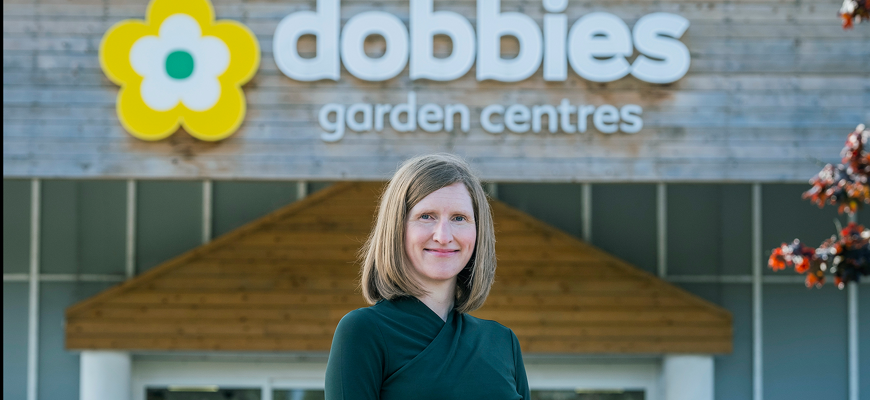In-house: The real deal

Tell us about your career path to date. What prompted you to work in-house?
I trained in a progressive private practice firm and spent a lot of time working directly with businesses – I quickly realised that I didn’t want to be an adviser on the sidelines but to be actively involved in driving businesses forward.
I then joined Scotia Gas Networks and SSE, where I had a great grounding in several business areas, before moving to an independent energy supplier and then across to retail in 2018.
What were your main drivers for working for Dobbies?
Behind a traditional, well known brand in Scotland sits a fast paced, multi-faceted UK retail business with huge growth opportunity and ambition. The business spans retail, services and restaurants and when I joined had huge growth plans which were attractive to me. At that point there were 37 stores and there are now 77. I felt it was a unique opportunity in Scotland for me to join the company and support the business’s growth. Also – I love scones!
As Chief People and Corporate Officer, what are your main responsibilities?
I’m a board director, leading all of our central support teams across the UK (People, Legal, Procurement, ESG, Health & Safety, Technical, operational compliance teams and information security teams). We’re tasked with ensuring the business runs safely and efficiently, and identifies opportunities to scale.
I’ve also acted as interim CFO of the business twice. Although perhaps an unusual role for a lawyer to step into, because I have a good understanding of all aspects of the business and had worked very closely with the previous CFOs it felt like a natural step. It also taught me a lot about how to run a team effectively without necessarily getting involved in the minutiae, and by trusting my colleagues.
Separately, in a departure from a core legal role, I’m on the Scottish Government’s Retail Industry Leadership Group and have also recently been appointed as the chair of the Scottish Retail Consortium, having been on the board of the SRC for three years, promoting the story of retail, shaping debates and influencing the issues that matter to everyone in the industry.
Why would you encourage young lawyers to consider a career in-house?
It’s a great opportunity to take the skillsets and discipline from private practice into an environment where you are challenged to think differently every day – and to make a difference to how your business runs and prospers. There is also huge opportunity to move into wider roles, which you are less likely to do in private practice as it is not generally set up that way by design.
What advice would you give lawyers who want to start a career in-house? What makes a good in-house lawyer?
Be prepared to get comfortable working with a degree of flexibility – no two situations are the same and a textbook answer is of no use to any business. Often common sense provides the answer. Always think about opportunities as well as risks, which can be very rewarding. Learn the financials and operations of your business end to end. A good in-house lawyer doesn’t think “as a lawyer” but as a business partner who thinks business first and uses their legal toolkit to support whatever needs done.
How does the future look for in-house lawyers? What are the key challenges and opportunities?
There are lots of opportunities to do interesting work with tangible outcomes in a variety of sectors, whether that is working for a local authority and assisting with children in care, or licensing applications, or working on end-to-end projects for a business. The value of in-house lawyers is becoming better understood, with 30% of Scottish lawyers now working in-house. I think there needs to be continued focus on illustrating the opportunities an in-house role can give – varying from a support function to becoming a business leader in a non-legal role.
Are there any pieces of legal work over your career that you are particularly proud of?
There are two in particular, before my time at Dobbies, which both involved tangible outcomes for people which was extremely rewarding for me. One was seeing a previous business safely through a difficult period which involved the business being bought out of administration by new owners, and as a result we managed to safeguard a lot of jobs. The other was completion of a new subsea electricity cable between a rural community in Scotland and the mainland. I worked with great teams in SSE and Norway, and together we delivered a secure energy supply for thousands of people. A section of that cable can now also be found at SSE’s visitor centre in Pitlochry.
How have you approached growing your legal teams throughout your career? Have you faced any particular hurdles with securing the go-ahead from your senior management?
I’ve been the first in-house lawyer for several businesses. The first thing is to build relationships and trust, and demonstrate the value you bring to the business. That takes time. Build a pipeline of work and make yourself indispensable. Partner with key roles across the business, picking up whatever needs to be done (“legal” or otherwise). Then show how developing your team will safeguard and support delivery of the business’s priorities, and the business case is easily justified (the savings on external legal spend always help!). I’ve always had the support of CEOs and CFOs on this basis. Sometimes the harder challenge lies in finding candidates with the right mindset who are happy to embrace the ups and downs of a business.
What does success look like for your team and how do you measure this?
Success means three things for my team:
- working across multiple teams to deliver business objectives, providing a rounded support to the business on whatever matters are at hand;
- thinking and planning forward in relation to upcoming risks and opportunities; and
- looking for opportunities to improve or simplify things within the business.
We measure this in both big and small ways – a thank you from another team, up to delivery of major projects, always taking on learning points along the way.
What do you love about your role, and what do you love doing when the working day is done?
I love being at the heart of the business – no two days are the same. In any one day, it is possible to hop between strategy, investor relations, menu tasting, store visits and spending time with my team on day-to-day priorities. At the end of the day, I love to be outside, so you are likely to find me running, or playing with the kids. I’m also a gardener in training…
How have attitudes and working practices in the legal profession changed since you started out?
Accessibility to the profession and flexibility within has improved, together with better recognition of the diversity of in-house roles. I think that in-house is now recognised as a career path in itself, but also that it presents the opportunity to diversify into wider business roles, using a legal background as a strong foundation. I have also found that private practice firms now make a real effort to understand their clients and work proactively with other professional advisers, which is really helpful for complex transactions. I’ve found that even the forced move to Zoom/Teams calls has helped to facilitate more collaboration between private practice firms and other advisers.
Do you think there is scope for in-house lawyers to make a sideways move, away from a purely legal role? What skills do you think lawyers can bring to roles that are not purely legal?
Absolutely – and to move forward using transferable skills. A legal training teaches you to be an objective, critical thinker together with the ability to balance differing views. Attention to detail is always important, as long as you ensure this doesn’t detract from the bigger picture. The core skills you learn as an in-house lawyer allow you to build skills for a lifetime, whether that is in a non-legal, business facing role or as a non-executive director. My role is a good example of that, and there are so many others.
How can solicitors build good mental health, increase resilience and manage stress successfully?
Lawyers are in a fairly unique position in the business – you have a profile and engagement at all levels. This should allow you to show leadership by setting the right example. Manage your workload, prioritise and delegate effectively, and trust others to take ownership. To manage stress and increase resilience, you need to have an outlet and someone to speak to. For me, running before work sets me up for the day, and a walk or cycle with my kids in the evening helps me unwind. Always remember to take things one day at a time.
And finally:
Best advice you’ve ever been given? Money spent travelling is never money wasted. Absolutely true; you should take every opportunity to see the world and experience different cultures.
Top 3 dinner party guests? Michelle Obama; Sir David Attenborough; Neil Armstrong.
If you had a superpower, what would it be? Truth detector – in a world where fake news is becoming so prevalent, always able to see through stories, fibs and misconceptions to know what is actually based in fact!
Questions put by Jennifer Malcolm, head of Legal, Offshore Wind at BayWa r.e
Regulars
Perspectives
Features
Briefings
- Criminal court: Boundaries of corroboration
- Corporate: Deceptive digital design – no clever cookie?
- Agriculture: Ending LDTs in a second short continuation
- Succession: Attorney as executor?
- Sport: Is that in the rules?
- Scottish Solicitors' Discipline Tribunal: December 2023
- In-house: The real deal
- Intellectual property: Making your mark with a sound






